Middle East
How Israel’s ‘plan’ for Gaza could turbocharge ethnic cleansing | Israel-Palestine conflict News
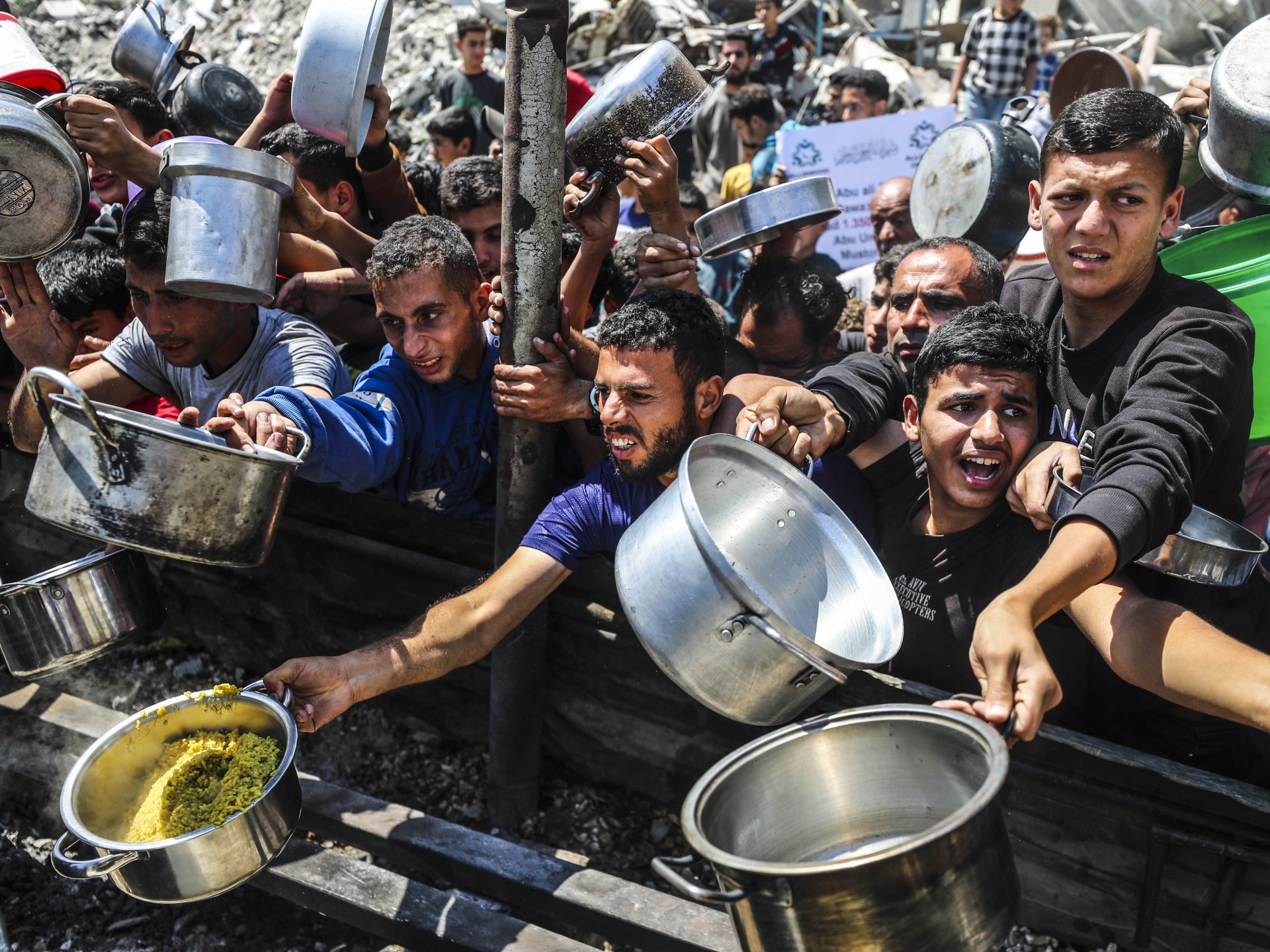
Israel’s far-right government has approved a “plan” to carve up and ethnically cleanse Gaza, analysts told Al Jazeera.
Israeli Prime Minister Benjamin Netanyahu announced the plan, couching it in claims that its goal is to dismantle Hamas and retrieve the 24 or so living captives taken from Israel on October 7, 2023.
Asserting that the “powerful operation in Gaza” was necessary, he went on to emphasise that “there will be a movement of the population to protect it.”
Here’s what you need to know:
What is this ‘plan’?
Israel will expel hundreds of thousands of hungry Palestinians from the north of Gaza and confine them in six encampments.
It says food will be provided to the Palestinians in these encampments, and that it will allow aid groups and private security contractors to distribute it. Palestinians will be forced to move – or starve.
Some 5,000 to 6,000 families will be pushed into each camp, according to The Washington Post. Each household will send someone to trek miles to pick up a weekly food parcel from what the Norwegian Refugee Council’s Jan Egeland called “concentration hubs”.
It is unclear how the rest of the population – possibly some 1.5 million people – will eat.
Israel says it will use facial recognition to identify people picking up food parcels, to deny aid to “Hamas” – yet Israel treats every fighting-age male as a Hamas operative.
The private security companies from the United States would also guard within the designated areas.
Experts and UN agencies are decrying the plan as impractical and inhumane.
What does this mean for the people of Gaza?
Israel’s genocidal war on Gaza continues, and Palestinians will continue to suffer.
Since Israel began its war on Gaza on October 7, 2023, it has cloaked its mass expulsions in what it claims are humane “advance warnings” in which families have mere hours to pack their belongings and flee to a zone Israel determines. Israel often bombs those safe zones anyway.
“If you are viewing this plan through aid distribution, it makes no sense,” Diana Buttu, legal scholar and former adviser to the Palestine Liberation Organization, told Al Jazeera.

“If you view it through a political project, which is ethnic cleansing and cantonisation by using food as a weapon of war, then this plan does make sense,” she said, adding that the “plan” is consistent with Israel’s aim of carrying out a genocide in Gaza.
What did the people of Gaza say?
That they are afraid, and starving, after two months of Israel blocking all aid and regular shipments of food.
“If there is a plan to expand the war and reoccupy Gaza and repeat the displacement, why were we allowed to return to the north again?” Noor Ayash, 31, asks.
“What more does Netanyahu want? We’re dying in every way.”
Mahmoud al-Nabahin, 77, who has been displaced for the past 18 months, says Netanyahu’s threats are meaningless.
He has lost everything; Israel killed his wife and daughter in a raid months ago, and their home and farm are gone.
“[This] means nothing but our annihilation. We’ve lost all hope. Let him do whatever he wants,” he says from his tent in Deir el-Balah.
“We don’t have weapons. We’re civilians left in the wind. People will refuse displacement, but will be forced by the army.”
What does Israel want?
They want to finish their genocide under the guise of facilitating food aid and rescuing Israeli captives, Omar Rahman, an expert on Israel-Palestine for the Middle East Council on Global Affairs, said.
“Israel has been telegraphing its real intentions from the start of this campaign: Destroy Gaza and eliminate its population both by starvation and mass killing,” he said.
Israel’s “plan” signals its intent to starve Palestinians who resist being expelled from north Gaza, said Heidi Matthews, a legal scholar at York University, Canada.
“It is inconceivable that the population can be adequately provided for … whilst being crowded into southern Gaza,” she said.
“This indicates the genocidal intent to inflict on the Palestinian population of Gaza conditions of life calculated to bring about its physical destruction in whole or in part.”
Can Israel even manage this?
Not clear.
Israel plans to hire two US private security firms, Safe Reach Solutions and UG Solutions, to provide security and possibly help with food distribution.
The first is headed by Phil Riley, a former CIA intelligence officer. The second is run by Jameson Govoni, a former member of the US Army Special Forces.
These companies could give Israel plausible deniability if abuses or atrocities occur, said Mairav Zonszein, an expert on Israel-Palestine for the International Crisis Group.

She added that Israel will also call up thousands of reservists to maintain a physical occupation over northern Gaza, despite many soldiers being fatigued by war and financial troubles.
“There is definitely a lower … turnout among reservists than at the start of the war. But that doesn’t mean there is actually a manpower shortage,” Zonszein told Al Jazeera.
In addition, she noted, despite Israeli society opposing expanding the war on Gaza without first retrieving the captives, Netanyahu is more concerned with appeasing far-right ministers in his coalition by fighting on.
Netanyahu risks losing power and standing trial for corruption charges if the coalition collapses.
Are aid agencies on board?
Not UN agencies.
A UN spokesman said Secretary-General Antonio Guterres was “alarmed” by Israel’s plan and that it will “inevitably lead to countless more civilians killed and the further destruction of Gaza”.
“Gaza is, and must remain, an integral part of a future Palestinian state,” said spokesman Farhan Haq.
The UN also issued a statement saying Israel’s plan for Gaza would “contravene fundamental humanitarian principles” and deepen suffering for civilians.
But the UN may conclude that it must participate in Israel’s scheme out of fear that even more Palestinians in Gaza will starve if it doesn’t, said Buttu, putting the onus on Western states, who primarily fund UN agencies, to support the UN’s position by sanctioning Israel.
Middle East
Hamas says it will release US-Israeli captive Edan Alexander | Israel-Palestine conflict News
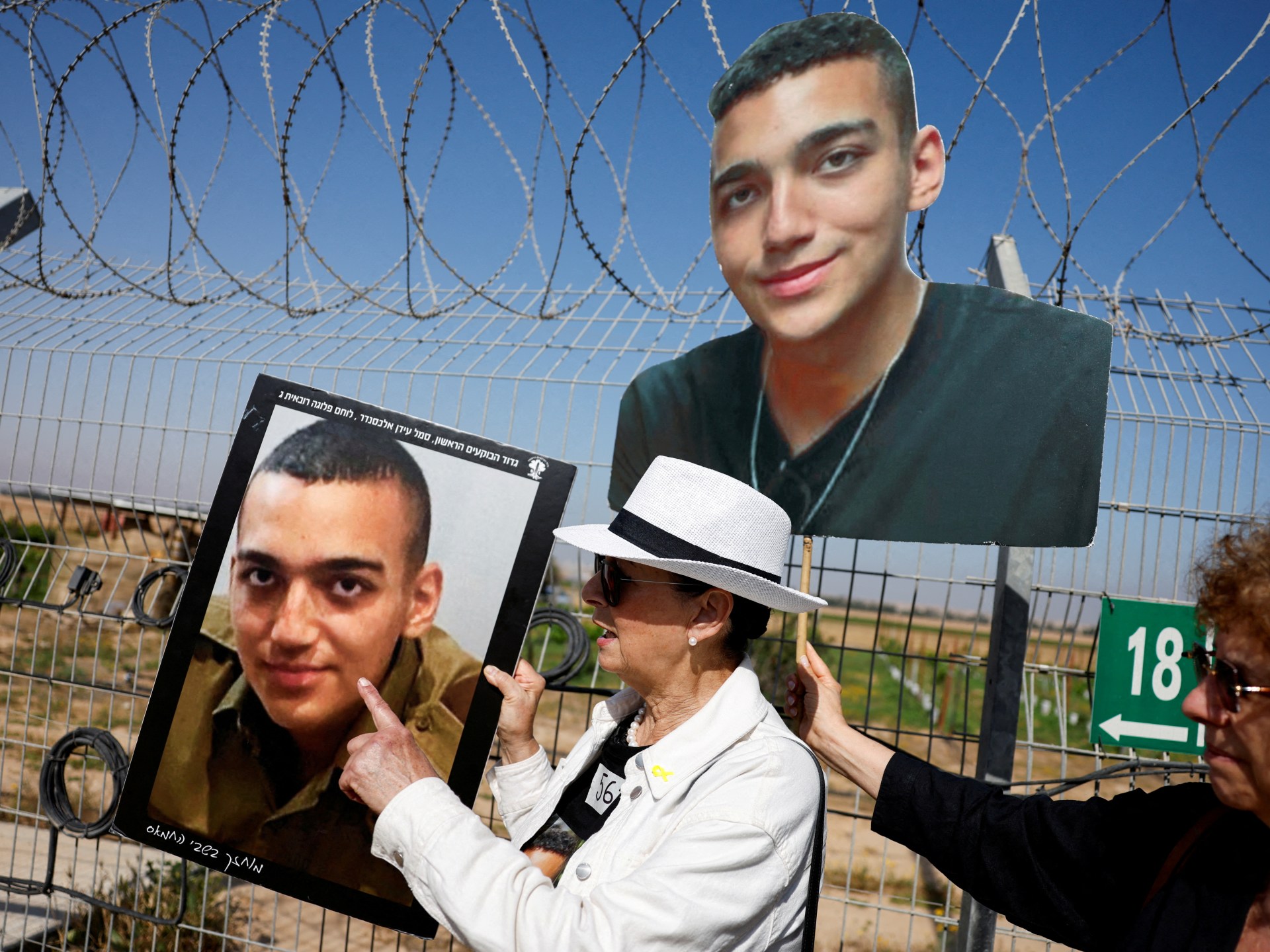
Hamas has said it will release a US-Israeli captive held in Gaza, as the group confirmed it was engaged in direct talks with the United States towards securing a ceasefire in the war-ravaged enclave and getting aid flowing again to a suffering Palestinian population.
The Palestinian group released a statement on Sunday: “Israeli soldier Edan Alexander, a dual US national, will be released as part of efforts towards a ceasefire” and the reopening of aid crossings. Israel has blocked all aid, including food, medicine and fuel, for 70 days.
The Hamas statement did not indicate when the 21-year-old Alexander would be released, but it is thought to be in the coming 48 hours.
Israeli media reported that US envoy Steve Witkoff will be in Israel on Monday as part of the deal.
The announcement comes shortly before US President Donald Trump’s visit to the Middle East this week – which does not include a trip to Israel. Trump and Witkoff have frequently mentioned Alexander by name in the past few months.
Alexander, who grew up in the US, was taken from his military base during the October 7, 2023 Hamas-led attack.
In its statement on Sunday, Hamas said it was willing to “immediately begin intensive negotiations” that could lead to an agreement to end the war and would see Gaza under a technocratic and independent administration.
“This will ensure calm and stability for many years, along with reconstruction and the end of the blockade,” the group said.
There was no immediate comment from the Trump administration.
Israeli Prime Minister Benjamin Netanyahu’s office said on Sunday that the US told Israel that Hamas’s freeing of Alexander would lead to negotiations for the release of more captives. The statement added that Israel’s policy hasn’t changed: negotiations will be conducted under fire with a continued commitment to achieving all war objectives.
‘A lot of questions’
Al Jazeera’s Hamdah Salhut, reporting from Amman, Jordan, said: “It’s unclear exactly what kind of reaction the Israeli government officials had with these direct talks between Hamas and the United States, but last time they were quite angry and that’s because the Israelis weren’t involved and had no knowledge of those talks and the Americans hit back by saying they didn’t need anyone’s permission to negotiate with any of the actors involved because they were American captives held in Gaza”.
“There are a lot of questions from a lot of different angles, specifically from the family members of those captives, from the larger part of Israeli society who have been protesting in the thousands for more than 1.5 years, accusing Benjamin Netanyahu of prolonging the war for his own personal and political gain. And in fact, Israeli officials have been saying the quiet part out loud in recent weeks, saying that the captives were not the main priority for the Israeli government and that they had other goals and objectives they needed to achieve”, she added.
“The family members of captives say that the Israeli government is choosing land grabs over the lives of Israelis who are still being held in Gaza”, she continued, referring to the Israeli government’s decision to expand its offensive in Gaza with a view to reoccupying parts of the territory.
Talks ongoing in Doha
Earlier on Sunday, two Hamas officials told the AFP news agency that talks were ongoing in the Qatari capital of Doha with the US and reported “progress” had been made.
One Hamas official, speaking about the talks with the US, said there was “progress made … notably on the entry of aid to the Gaza Strip” and the potential exchange of captives for Palestinian prisoners in Israeli custody.
A second official also reported progress “on the ceasefire in the Gaza Strip”.
Israel shattered the last ceasefire, which lasted two months, on March 18, launching a major offensive in Gaza and ramping up its bombardment of the territory.
It has also cut off all aid to Gaza since March 2, saying it would pressure Hamas to release the remaining captives. None have been released since the fleeting truce earlier this year, when several captives were exchanged for Palestinian prisoners.
A total of 59 captives are still in Gaza, around a third of them believed to be alive, after most of the rest were released in ceasefire agreements or other deals.
Starvation has taken hold across Gaza due to the Israeli blockade.
Earlier this month, the Israeli government approved plans to expand its offensive in the Gaza Strip, with officials talking of retaining a long-term occupying presence there.
The Health Ministry in Gaza said on Sunday that at least 2,720 people have been killed since Israel resumed its assault, bringing the overall Palestinian death toll since the war broke out to 52,829.
Middle East
Israel attacks Yemen’s Hodeidah, striking port areas | News
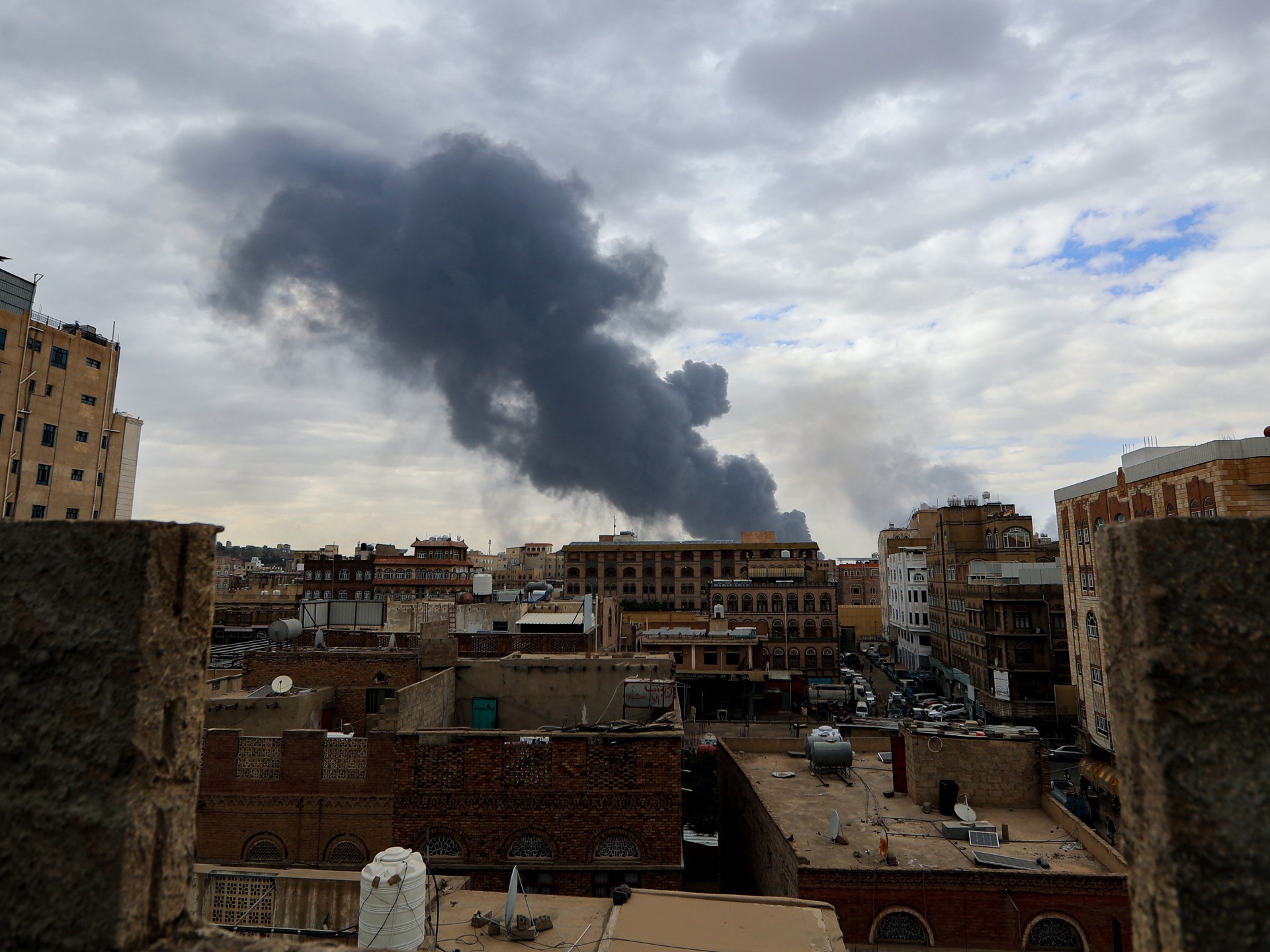
Israel has previously bombed Hodeidah and Sanaa International Airport; Houthi missile targeted Ben Gurion Airport in Tel Aviv.
Israel has launched air attacks on Yemen’s Hodeidah governorate, according to the Houthi Interior Ministry.
The attack late on Sunday came after the Israeli army said it had warned those present at three Houthi-controlled ports in the area to evacuate.
It was the latest salvo in exchanges between Israel and the Houthis.
Israel bombed the Hodeidah port after a Houthi attack near Ben Gurion Airport in Tel Aviv earlier this month.
Israeli strikes have also targeted parts of the Yemeni capital Sanaa and the main international airport there.
The Houthis have been firing missiles at Israel and on Israeli targets in the Red Sea in solidarity with Palestinians under fire since the war on Gaza began 19 months ago. Israeli attacks on Gaza have killed more than 52,000 people, including 57 who starved to death due to the total Israeli siege since March 2, according to Palestinian officials.
A ceasefire deal between Yemen’s Houthis and the United States does not include any operations against Israel, the group’s chief negotiator announced earlier this week. The Houthis stopped firing on Israel during the Gaza ceasefire earlier this year, but resumed when Israel imposed its punishing blockade and then resumed the war soon after.
The US military had been launching daily air strikes across Yemen for nearly two months, destroying infrastructure and killing dozens of people, including children and civilians.
Middle East
Sudan’s army and RSF paramilitary launch attacks across war-ravaged nation | Sudan war News

Port Sudan, el-Fasher, West Kordofan and West Darfur have all seen heavy fighting.
Multiple attacks by Sudan’s armed forces (SAF) and the paramilitary Rapid Support Forces (RSF) have struck various locations across the country now in its third year of a civil war.
At least nine civilians, including four children, were killed and seven injured in attacks on Sunday by the RSF in el-Fasher, the capital of North Darfur state in western Sudan, according to the Sudanese army.
During a sweep of the city, the SAF killed six RSF members and destroyed three combat vehicles, according to the statement. There was no immediate comment from the RSF on the army report.
El-Fasher is the last major city held by SAF in Darfur. For over a year, the RSF has sought to wrest control it, located more than 800km (500 miles) southwest of the capital, Khartoum, from the SAF, launching regular attacks on the city and two major famine-hit camps for displaced people on its outskirts.
In the meantime, Sudan’s civil defence forces announced on Sunday that they have full control over fires that erupted at the main fuel depot and other strategic sites in Port Sudan, the seat of the army-backed government, which has come under daily drone attacks blamed on the RSF over the past week.
The fires caused by a drone strike on the fuel depot on Monday had spread across “warehouses filled with fuel”, the Sudanese army-aligned authorities said, warning of a “potential disaster in the area”.
The Red Sea port city had been seen as a safe haven from the devastating two-year conflict between the SAF and RSF before the drone strikes began on May 4.
The attacks have damaged several key facilities, including the country’s sole international civilian airport, its largest working fuel depot and the city’s main power station.
On Tuesday, Sudanese authorities accused the RSF of being behind the drone strikes. The RSF has not commented on the allegations.
Port Sudan is the main entry point for humanitarian aid into Sudan. United Nations Secretary-General Antonio Guterres warned that the attacks “threaten to increase humanitarian needs and further complicate aid operations in the country”, his spokesman said.
Sudan’s army launched air strikes on the RSF in el-Khuwei in West Kordofan state and the state of West Darfur late on Saturday. El-Khuwei was captured by the RSF last week.
Activists and Sudanese accounts shared a video clip on social media showing the Sudanese army and their allied forces announcing that they had regained control over el-Khuwei after battles with the RSF on Sunday, according to Al Jazeera’s Sanad fact-checking agency.
Witnesses also reported drone strikes on Sunday, targeting the airport in Atbara, a city in the northern state of River Nile.
The RSF has been battling the SAF for control of Sudan since April 2023. The civil war has killed more than 20,000 people, uprooted 15 million and created what the UN considers the world’s worst humanitarian crisis.
-

 Middle East2 days ago
Middle East2 days agoIraq look to former Australia coach Arnold to boost 2026 World Cup hopes | Football News
-
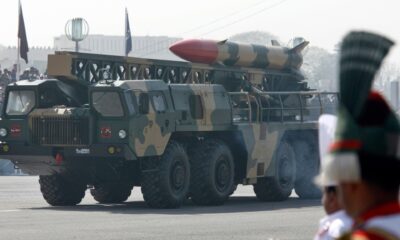
 Conflict Zones2 days ago
Conflict Zones2 days agoCould India, Pakistan use nuclear weapons? Here’s what their doctrines say | India-Pakistan Tensions News
-

 Europe2 days ago
Europe2 days agoEuropean leaders arrive in Kyiv in show of support for Ukraine
-

 Europe2 days ago
Europe2 days agoRare medieval manuscript virtually unwrapped to reveal hidden details
-
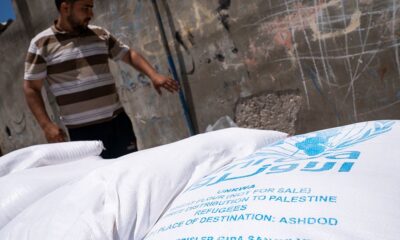
 Africa2 days ago
Africa2 days agoUS unveils Gaza aid plan
-

 Sports2 days ago
Sports2 days agoTimberwolves searching for fan accused of ‘racially charged comments’ toward Draymond Green and say another fan was ejected
-
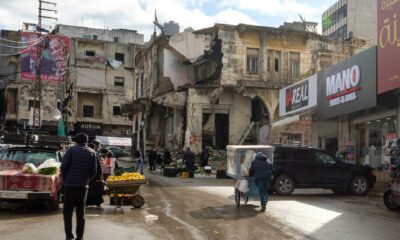
 Middle East2 days ago
Middle East2 days agoAfter Israel’s bombs, Nabatieh’s Monday Market revives itself once again | Israel attacks Lebanon
-

 Education2 days ago
Education2 days agoTrump’s dismantling of Education Department gives states ‘green light’ to pursue voucher programs




